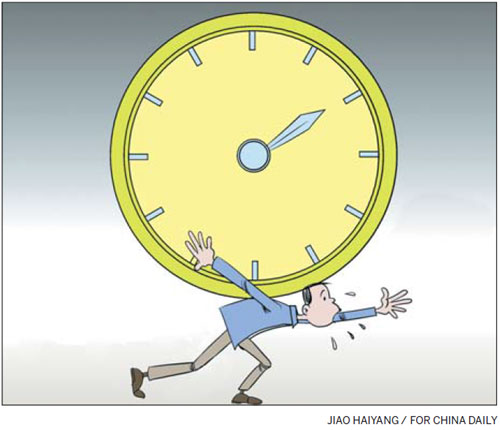Working for the right balance
Updated: 2014-06-02 08:17
By Kristine Yang in Hong Kong (China Daily)
|
|||||||||||

Hours in Europe
That's much longer than countries like France, which has a 35-hour workweek and a labor law introduced this year discourages workers in the digital and communications industries from accessing work-related e-mails or notifications after office hours, and also discourages employers from pressuring them to do so.
Germany has a similar law and Sweden is considering a 30-hour workweek.
Average workweeks in most developed economies have generally been dropping.
Across the Organization for Economic Co-operation and Development countries (which includes Japan, South Korea and Australia), the average worker put in 1,765 hours of work in 2012, compared to 1,844 hours in 2000.
Still, the average employee in Asia works 2,154 hours per year, 13 percent higher than the global average of 1,915 hours, according to the UBS Prices and Earnings report from 2012 that the investment bank publishes every three years.
But despite the long hours, Asian workers are not necessarily much more productive.
In terms of GDP per hours of work, the most productive workers in the world are in the United States, the Netherlands, France, Germany, Sweden and Australia, according to The Conference Board, a global business membership and research association.
Among the five cities in the world with the longest working hours, three are in Asia. Hong Kong ranked third among the 72 cities surveyed, with the average worker spending 2,296 hours per year at their job.
In Bangkok, workers spend 2,312 hours at work every year and in Seoul 2,308. In Shanghai, the average work year is 1,967 hours and in Tokyo it is 2,012 hours.
In New York, the average employee works 2,062 hours in any given year and 2,375 in Mexico City, which gives it the honor of having the longest work hours in the world. In Paris, the average worker spends just 1,558 hours at work.
On the one hand, the long work hours have been a key driver of economic growth. On the other, employees get burned out quickly and are more likely to change jobs faster. This creates a problem for companies that have difficulty retaining staff. Higher turnover translates into higher costs.
In general, companies are not ready to deal with the challenges of retaining staff, according to another survey by Deloitte, an accounting and consulting firm.
In its Global Human Capital Trends 2014, the firm found that leadership, retention and engagement are key priorities for companies around the world, but few are prepared to ensure workers benefit from them.
And in the Asia-Pacific region, where the hours are the longest and retention the biggest problem, dealing with the issue was a priority for 12 percent fewer respondents. Across the region, companies said they needed to improve the capabilities of their workforce.
"Different regions may have different modules for setting out the standard working hours," says Loretta Shuen, chairman of the taxation committee of CPA Australia.
"Standard working hours do not mean you cannot work overtime. You just have to have compensation for the overtime work. As industries and individuals may have different requirements, we don't agree with issuing a policy without careful consideration."
Although Hong Kong has been considering standard working hours since 2010 and the Labour Department completed a policy study in mid-2012, nothing has happened since.
CPA Australia's survey showed half of the respondents work 41 to 50 hours per week and 40 percent work more than 51 hours per week. One in five people work more than 61 hours per week.
Related Stories
Working hours could harm workers and employers 2013-10-18 08:38
Today's Top News
Brazil installs Chinese security systems for Cup
Spain's king abdicates to revive monarchy
FIFA probe into Qatar 2022 to report
Beijing to ease green card rules
World Cup showcases chances in Brazil
Abe, Hagel's accusations rejected
Yuan clearing bank to open in UK
Working for the right balance
Hot Topics
Lunar probe , China growth forecasts, Emission rules get tougher, China seen through 'colored lens', International board,
Editor's Picks

|

|

|

|

|

|





